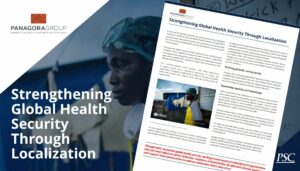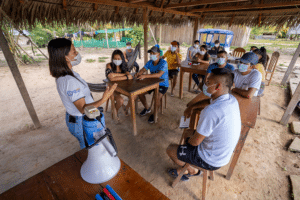
This article was originally published in “American Development Companies: Addressing a World in Crisis“, a compendium of work performed by PSC’s Council of International Development Companies (CIDC) members in partnership with USAID, the Department of State, and other U.S. foreign policy-focused agencies.
Strengthening Global Health Security Through Localization
As we know all too well, diseases can spread quickly across the globe, resulting in pandemics that overwhelm health systems and upend lives and economies. We also know that local communities must be involved from the outset for global health security interventions to be successful in the long-term.
Through the USAID Localize Global Health Security (LGHS) project, Panagora Group, together with partners PATH and Itad, is supporting local organizations around the world to address prioritized health security gaps and strengthen their capacity to protect their communities from infectious disease threats.
Thinking Globally, Acting Locally
Through LGHS, we localize global health security, working in each country to identify local organizations who can most influence better detection, response, and prevention of infectious disease outbreaks and support local communities to address outbreaks where they occur.
As a woman-owned small business with deep experience in global health and a long-term dedication to locally led approaches, Panagora is right-sized to take on this role; we easily work with smaller local health actors and can quickly pivot as needs evolve.
For this project, we are building on the work of other USAID global health programs by working with local actors to 1) address critical health security gaps identified in national health security capacity assessments through grants and technical assistance in prioritized technical areas, 2) strengthen organizational capacity of local entities to effectively manage implementation of health security interventions, and 3) expand the global knowledge base of approaches and best practices.
As of March 2024, LGHS countries include Cameroon, Jamaica, Kenya, Senegal, Sierra Leone, Tanzania and Zambia, and we will expand to a total of 15 countries across Africa, Asia, Eastern Europe, Latin America, and the Caribbean.

Photo: USAID Peru
Expanding Capacity and Knowledge
LGHS complements the multisectoral, cross-technical approaches of other Global Health Security (GHS) programs to move countries closer to achieving Global Health Security Agenda targets. A $14.4 million flexible grants program aims to address subnational gaps in global health security, accompanied by technical assistance in GHS and capacity strengthening to support organizational growth.
Grantees will participate in local and global peer networks to share their experiences, lessons learned, and best practices—including in-person and virtual events and capacity-building workshops—and have access to resources to increase their GHS knowledge and skills.
Through this groundbreaking project, we are thrilled to be achieving our mission of “making our world a better place for good” by helping USAID meet its localization goals and increase health security at a local and global level.